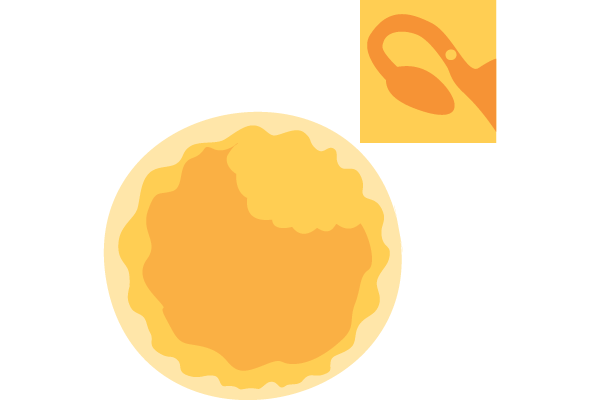
2 weeks pregnant
For information about weeks 1 through 11 of a twin or multiple pregnancy, tap here.
Great things come in pairs — sperm and egg, you and your baby, week two of pregnancy! This is a big week, because right around now, fertilization is happening! Read on to learn more about all the excitement.
How’s Baby?
If you’ve been trying to conceive (TTC) without assistance, your egg was patiently awaiting for sperm to arrive in your fallopian tube. And now, the stars have aligned and a single sperm cell has managed to reach and penetrate that egg cell! Fertilization has occurred! The sperm and egg exchange their genetic information, stored on chromosomes, and unite to form a zygote.
Next week, the zygote will begin rapidly dividing on its roughly week-long journey from the fallopian tube to your uterus. Once your little bundle of joy is a little bundle of cells, it is officially termed a blastocyst. Soon it will implant itself in your uterine wall. This is implantation! And within that cute little blastocyst, the foundations of the embryo, the amniotic sac, and the placenta are forming.
What's new with you?
If you haven’t been trying to conceive (TTC), you probably don’t know that you’re pregnant yet. And because this pregnancy is so new, you probably aren’t experiencing any major symptoms. However, some folks do experience spotting, tender breasts, fatigue, aversions to certain foods, and an increased need to pee.
However, if you have been TTC and actively monitoring your basal body temperature in an effort to get pregnant, you may notice the temperature remains elevated after ovulation, when it would typically drop if you weren’t pregnant. Your body is also releasing an immunosuppressant protein known as Early Pregnancy Factor (EPF) that instructs your body not to reject the developing cells from your body. Though it’s readily apparent yet, the beginning of a great chemical change is happening in your body, as it primes itself to carry Baby to term.
Reviewed by the Ovia Health Clinical Team
Read more
Sources
- Mayo Clinic Staff. "First trimester pregnancy: what to expect." Mayo Clinic. Mayo Clinic. February 26, 2020. Web.
- "Fetal Growth Chart." BabyYourBaby. Utah Department of Health, n.d. Web.




